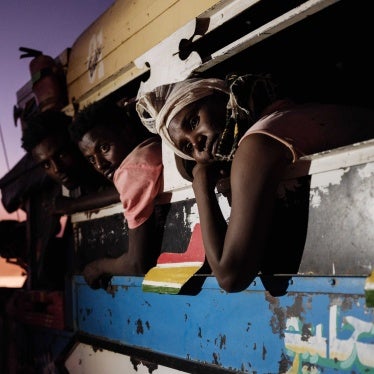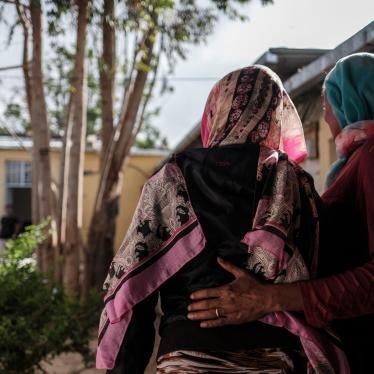Dear Foreign Minister,
We understand that you will have the opportunity to meet with Somali President Hassan Sheikh Mohamud this week in conjunction with the European Union’s Foreign Affairs Council.In this regard, we are writing to share with you details of an urgent case that in many ways is a test case of the President and his government’s willingness to implement pledges to address human rights violations committed by state security forces, including sexual violence, pursue accountability for such abuses, and respect freedom of the press. In raising this case with President Hassan, we hope you will convey the EU’s and its member states’ profound concerns about the handling of the case and the broader risks it raises regarding human rights under the new Somali government.
On January 10, 2013, the Somali police in Mogadishu arrested a woman who reported to police that she had been raped by government security forces in late 2012. They also detained a journalist, Abdiaziz Abdinur Ibrahim, who interviewed her in January 2013, and two acquaintances of the alleged victim who had put her in contact with journalists. The woman was released on January 12 after she recanted her allegations, but her husband, who maintains that she was raped, was detained in her stead. The four detainees were held for more than two weeks without charge. The names of the alleged rape victim, her husband and the two acquaintances are known to HRW, but we have chosen not to disclose them further in public to respect their privacy.
On January 29, the attorney general charged all five with multiple crimes under the Somali Penal Code that could result in prison terms of several years. The charges include insulting the government and inducing false evidence. The charge sheet indicates that the government believes there was a conspiracy to discredit the government and somehow acquire financial gain. The next court hearing is scheduled for February 2.
Somalia is a party to the International Covenant on Civil and Political Rights, which protects the right to freedom of expression and to seek an effective remedy for rights violations. The charges against all five individuals violate the right to seek, receive and impart information.
The police and high-ranking members of the Somali government have publicly dismissed concerns surrounding the investigation and detentions of these individuals, pointing to the lack of evidence of the alleged rape and dismissing serious procedural flaws concerning the detentions. The authorities have paraded the alleged rape victim before the media. They contend that the journalist – who never reported the story to any media outlet and was in the midst of corroborating the details – was seeking to tarnish the image of the new government. For instance, the attorney-general, Abdulkadir Mohamed Muse, suggested in an interview with the BBC on January 26 that the journalist and the other individuals could be responsible for complicity in an effort to tarnish the reputation of the security forces.
Based on the information available to Human Rights Watch, we believe that these charges are a politically motivated attempt to silence reporting about alleged serious rights violations by Somali security forces, and would effectively make it a criminal offense for journalists to speak to victims of abuses, an extraordinary violation of the right to freedom of expression. The charges compound the abuse suffered by the alleged rape victim, her family and acquaintances, and the journalist, who have already experienced arbitrary detention and harassment at the hands of the police. Furthermore, by publicly declaring the detainees guilty in press conferences and media interviews, Somali officials have significantly undermined the detainees’ presumption of innocence.
We are extremely concerned by the police’s handling of this case, not only at an individual level, but because it has long-term significance and implications for media freedom and for victims of abuse by government forces. Detaining an alleged victim of rape and those linked to her is a disturbing response to Somalia's endemic sexual violence and risks deterring victims of sexual violence from reporting the crimes.
Rape and other sexual violence have been widespread throughout the Somali conflict and remains a serious concern. Human Rights Watch research in Mogadishu in 2011 and 2012 found that internally displaced women and girls, notably from minority clans such as the alleged victim in the case above, are particularly vulnerable to rape. While armed men in uniform, including government soldiers and allied militia are often identified as the perpetrators, women and girls have been reluctant to report rape to authorities because of fear of reprisals, lack of trust in the authorities, and the limited medical, psychosocial, and legal services available to them. In recent months, sexual violence in Mogadishu is finally being reported on and more services could be provided to survivors, but this case could undermine these positive steps.
The Somali authorities should be dedicating resources to investigating and holding government forces to account for these abuses, as the president committed to doing in November 2012.
Similarly, journalists in Somalia have continued to pay a heavy price for their efforts to report on abuses by all parties to the conflict. Last year was the deadliest year on record: fifteen journalists were killed in 2012 in government controlled-areas, which the Transitional Federal Government (TFG) of Somalia failed to investigate.
We therefore call on youand your EU colleaguesto use your meeting with Somali President Hassan Sheikh Mohamud to:
- Make it clear that the government has obligations to promptly and thoroughly investigate alleged abuses by Somali security forces and that those responsible be fairly and appropriately prosecuted;
- Request that the charges against the journalist, the alleged victim, and others charged in this case are immediately dropped;
- Urge that those implicated in human rights violations associated with this case be appropriately disciplined.
With the adoption of the EU Strategic Framework on Human Rights and Democracy the EU pledged to raise human rights issues “vigorously in all appropriate forms of bilateral dialogue, including at the highest level”. We call on you to live up to this pledge.
We believe it is vital that President Hassan understand that the mishandling of this case is undermining the Somali government’s expressed commitment to human rights, notably freedom of the press and addressing sexual violence, at a critical juncture in the new government.
Please do not hesitate to contact us for any questions or concerns regarding this case and other human rights developments in Somalia.
We thank you for your attention to this urgent matter,
Sincerely,
Lotte Leicht - EU Director
Daniel Bekele - Africa Director






